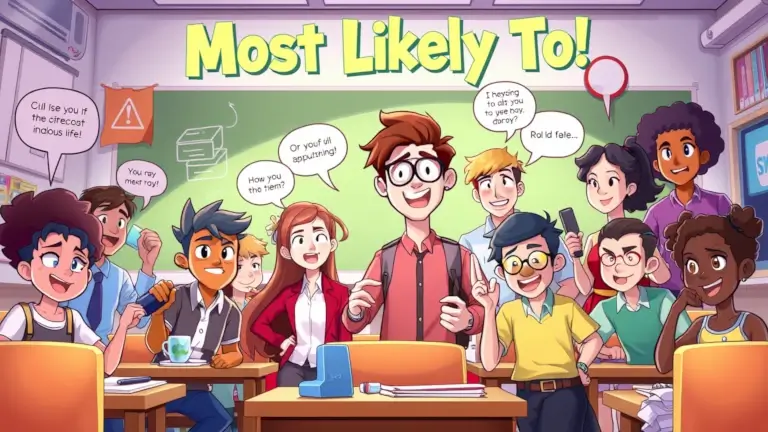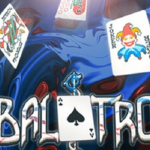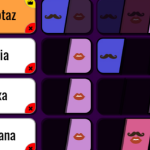

Favourite Games
Who Is Most Likely To

Who Is Most Likely To is a party game built entirely around social interaction, humor, and personal impressions. The game poses simple prompts beginning with “Who is most likely to…” and challenges players to answer by pointing, voting, or calling out someone in the group. These questions range from absurd to deeply relatable and can reveal how people are perceived by others. The appeal lies not in winning but in the reactions, debates, and laughter that each question triggers.
This game thrives in group settings—whether you’re at a party, hanging out with close friends, or even getting to know new people. Unlike traditional board games that depend on scorekeeping or complicated rules, Who Is Most Likely To removes competitive pressure and instead focuses on conversation, unexpected admissions, and quick thinking. All it takes is a good group and a list of thought-provoking or silly questions to keep the session alive.
How to Play Who Is Most Likely To
The gameplay is straightforward. Players gather in a circle or a group, and someone reads out a prompt that begins with “Who is most likely to…” followed by a situation or behavior. For example, the question might be, “Who is most likely to forget their own birthday?” After hearing the prompt, everyone points to the person they believe best fits the description—or takes turns giving their answer aloud.
There are different ways to structure the game depending on preference. Some groups choose to vote silently, while others prefer open debate before agreeing on someone. Some play with scoring, assigning a point to each person who receives the most votes per round. Others play with no scores at all, focusing purely on the reactions and storytelling that follow each decision. The format is flexible, allowing for short bursts of play or longer sessions depending on how much time you want to spend.
Types of Questions You’ll Encounter
One of the most entertaining parts of Who Is Most Likely To is the sheer variety of questions that can be used. Some are lighthearted and fictional, while others bring out real memories or assumptions about people’s personalities. You can use pre-written cards, find questions online, or make up your own.
Here are a few common types of questions:
- Funny or Ridiculous:
“Who is most likely to fight a goose?”
“Who is most likely to accidentally marry someone in Vegas?” - Personality-Based:
“Who is most likely to cry during a movie?”
“Who is most likely to talk to themselves in public?” - Embarrassing but Harmless:
“Who is most likely to trip over their own feet?”
“Who is most likely to send a message to the wrong person?” - Relatable or Everyday Situations:
“Who is most likely to forget their password?”
“Who is most likely to be late to every event?” - Thought-Provoking or Slightly Serious:
“Who is most likely to move to another country?”
“Who is most likely to change careers five times?”
The type of questions you choose can completely change the tone of the game—from silly to sincere. You can even play themed rounds, like “school questions,” “vacation questions,” or “awkward moments.” This keeps the experience fresh and lets players adjust the tone based on the group they’re with.
Tips for Playing the Game
While the game is designed to be easy and intuitive, a few tips can make the experience even better:
- Know Your Group: The best sessions happen when the questions match the comfort level of the people playing. If you’re with close friends, you can push the humor or personal questions further. With a mixed group, it’s safer to keep it light and general.
- Keep It Moving: Don’t get stuck on one question for too long. The game flows best when everyone responds quickly and moves on to the next prompt. You can always revisit a funny story later.
- Encourage Explanations: After pointing to someone, ask for a reason why. This opens the door for jokes, storytelling, or even teasing (when appropriate). These moments are often the most memorable parts of the game.
- Use a Random Reader: Rotate who reads the questions to keep everyone involved. Some players will naturally be more vocal, but letting different people take the lead keeps things balanced.
- Create Custom Questions: If you’re playing with a tight-knit group, writing your own questions can be even more entertaining. Include references to past events, inside jokes, or traits unique to your group.
Expanding the Experience
The flexibility of Who Is Most Likely To makes it suitable for many different environments: late-night parties, small gatherings, or even virtual calls. There’s no need for equipment—just a list of prompts and a willingness to participate. Because of its conversational nature, it often leads into other games or topics. Many players start with Who Is Most Likely To as an icebreaker and then transition into other social activities afterward.
Who Is Most Likely To Unblocked
Who Is Most Likely To Unblocked is a version of the popular game that you can play at school without restrictions. It runs directly in the browser, requires no downloads, and lets students have fun answering unexpected questions about their classmates. With simple controls and no access limits, the game works smoothly on school computers, even when other sites are blocked.
A Note About Other Games on the Site
If you enjoy games that focus on interaction, personality, and humor, there are several other options worth trying. Guess Whooo? is a great guessing game where players match facts to people. Scrabble provides a more word-focused challenge perfect for quieter sessions. And Monopoly offers a classic economic competition for players who enjoy long-term strategy and trading.
FAQ – Who Is Most Likely To
Q: How many players do you need to play Who Is Most Likely To?
A: The game works best with 4 or more players, but it can be played with as few as two people. The more players involved, the more varied and surprising the answers become. Larger groups also create better opportunities for debates and reactions.
Q: Do you need any special materials to play?
A: No special equipment is needed. You can use printed cards, a phone app, or just read questions from a list. As long as someone has access to prompts, the game can be played anywhere—at home, outdoors, or even over a video call.
Q: Is there a winner in this game?
A: Not necessarily. Who Is Most Likely To doesn’t require scoring, but you can introduce a point system if you want. Some groups award a point to the person with the most votes per round or keep track of how often each person is selected. It’s completely optional and depends on how you want to play.
Q: Can the game be adapted for different age groups?
A: Yes, the game can be customized easily. For younger players, use school- or hobby-themed questions. For adults, you can include more personal or complex topics. The tone of the game depends entirely on the prompts you choose.
Q: What should you do if someone feels uncomfortable with a question?
A: If a question feels too personal or makes someone uneasy, it’s fine to skip it and move on. The goal is to have fun, not make players uncomfortable. It’s a good idea to agree in advance that anyone can pass on a question without needing to explain.
Q: How do you make the game last longer?
A: You can create custom questions, divide the game into themed rounds, or add twists like story explanations after each vote. If you’re playing with a scoring system, you can set a target score or a time limit to keep the game structured.
Q: Can this game be played online or virtually?
A: Yes, it works well over video calls. One person can read the questions aloud while others respond verbally or by typing in a chat. There are also websites and apps that offer digital versions of the game for remote play.
Q: What kind of topics are best for creating your own questions?
A: Think about everyday habits, funny mistakes, wild hypotheticals, or real situations you’ve shared with your group. Questions based on shared experiences or inside jokes often get the biggest reactions and make the game more personal.
Discuss Who Is Most Likely To











